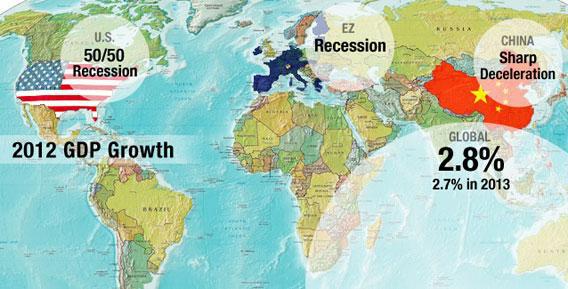I realize it feels very much like the first one never ended (Great Recessions are like that folks). But Nouriel Roubini, my friend and former boss, has just issued the Roubini Global Economics 2012 Outlook, and it’s ugly.
Roubini, along with his team of economists see the euro zone’s dysfunctions as putting the US in a 50 percent chance of a new downturn. This time, however, the “decoupling” that many in 2008 wrongly thought would save the emerging powers of the global economy from a deadly synchronized downturn cannot plausibly be asserted. If the factors cited by Roubini all align, this time, the downturn is likely to be general. That is obviously bad news - but in the longterm it could force the deleveraging and regulatory reform that must happen in the developed world, and “rebalancing” in the emerging one.
The bad hat here, not surprisingly, is Europe. Written off as irrelevant by so many casual observers (and sharky commenters, I might add), the euro zone’s inability to stem its bleeding now ranks as the number one threat to the world’s growth.
US policy has been relatively rational - divided government confers few blessings, but one of them has been that Democrats have managed to prevent radical austerity prescriptions from taking root - a fate that would doom the US to Euroland-style negativity. But the Fed is already in full monetary stimulus mode, and fiscal stimulus ala Congress has about as much chance in a presidential election year as Harvey Firestein does winning statewide office in Texas.
So, gird yourself, but whatever you do, be clear eyed about how we got here: Deregulated financial markets (particularly the mortgage industry), reckless government borrowing (particularly in low and no-growth Europe), and an unwise refusal in China to “balance” its own economy – i.e., to stoke domestic demand at home - which has made it more vulnerable than it needs be on growth in Europe and the U.S. Here’s a slice of Roubini’s own analysis (for more, you’d have to be a client. Note that text in brackets [like this] indicates I’ve removed client sensitive specific numbers)..
No Such Thing as a Free Lunch
By Christian Menegatti, Rachel Ziemba and Nouriel Roubini
Our global growth baseline now includes a sharp slowdown in China, a recession in Europe and the risk of a mild downturn in the U.S. We forecast global growth of [under 3%] in 2012, moderating further … in 2013 (close to half of the 5.1% pace of 2010).
Our views on the global economy hinge in large part on the severity of the developments in the eurozone (EZ)—… with a continued credit crunch, fiscal austerity and a likely Greek exit from the monetary union. Debt restructurings will deepen the contraction in 2013 as EZ leaders proceed with an incremental policy response that will buy time but not bring resolution to the crisis. Fiscal austerity in the EZ periphery as well as in the core could bring growth across the region [much further] in 2013, and a disorderly outcome to the crisis would lower EZ and global growth further.
• The U.S. looks marginally stronger than when we last updated our Outlook, due in part to the unwinding of several external shocks that stalled growth in Q1 2011. We have revised up our forecasts but do not dismiss the possibility of a mild recession in 2012, with plenty of downside risks from the EZ crisis, self-imposed fiscal drag, ongoing deleveraging in the household sector (amid weak labor income generation and persistent downward pressure on real estate and financial wealth), rising inequality and political gridlock.
• Flaws in China’s growth model are becoming obvious. Falling property prices are starting a chain reaction that will have a negative effect on developers, investment and government revenue, and this is happening as net exports become a drag on growth: China’s trading partners in developed markets (DMs) are either at stall speed (the U.S.) or in recession (the EZ). Having aimed to cool the property market to rope in runaway prices, Chinese leaders will be hard put to restart growth. We consequently expect growth of [well below 8% in 2012 and 2013 - specific numbers reserved for RGE clients] —well below consensus—and see risks to the downside.
• Due in large part to China’s slowdown and lessened capacity to stimulate, emerging Asia is the only region that will just match its 2009 performance in 2012, expanding by [just above 6%]. EMs in aggregate will grow only 5%, and all regions will see growth largely below potential. LatAm and the Middle East and North Africa (MENA) will suffer from reduced commodity demand out of China, while emerging Europe will experience
a sharp deceleration due to stress in the EZ. No region will escape the effects of broader risk aversion, which will accentuate their cyclical slowdown.
I swear off gloom and doom for the rest of the year - but this is an important story that should be absorbed.
